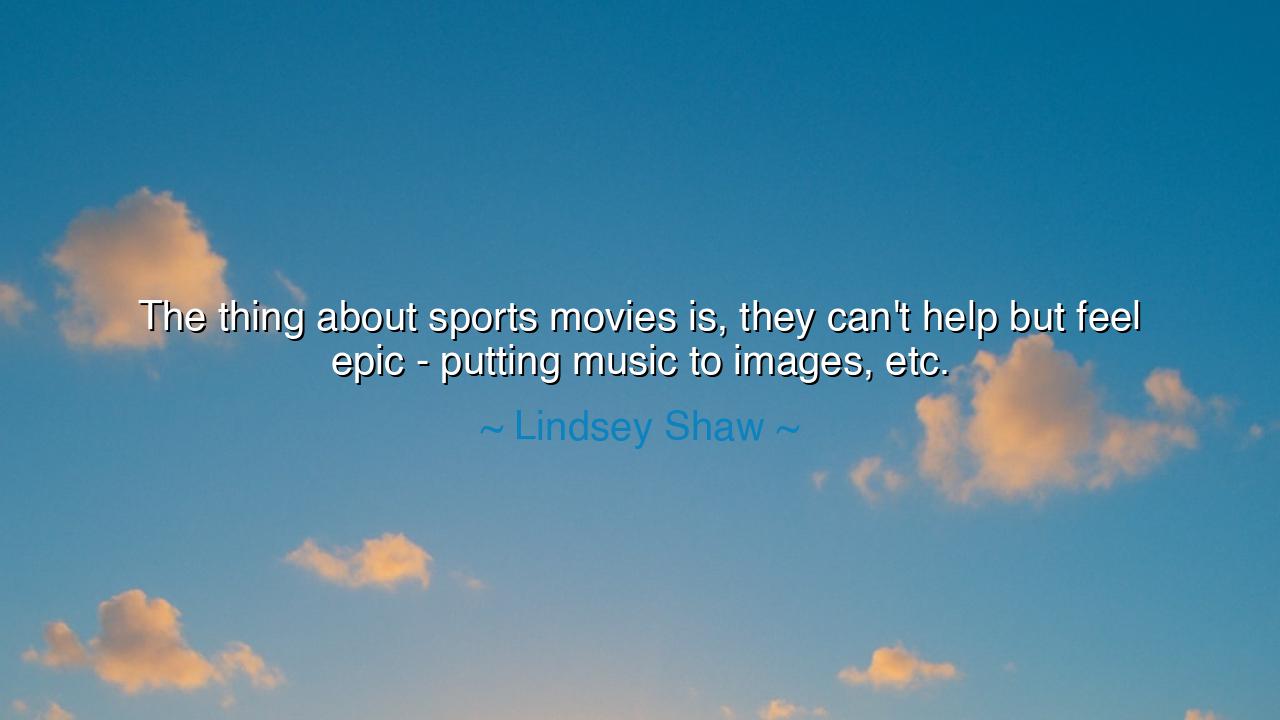
The thing about sports movies is, they can't help but feel epic
The thing about sports movies is, they can't help but feel epic - putting music to images, etc.






Hearken, O seekers of awe and inspiration, and attend the words of Lindsey Shaw, who spoke with the understanding of one attuned to the power of story: “The thing about sports movies is, they can't help but feel epic—putting music to images, etc.” In these words lies a truth timeless and profound: that the marriage of motion, struggle, and art evokes in the human soul a sense of grandeur, courage, and transcendence, elevating mere contest to the realm of legend.
The origin of this insight rests in Shaw’s reflection upon the craft of cinema. Sports movies, like the epic tales of old, blend visual spectacle and musical cadence, dramatizing human endeavor and the pursuit of excellence. Every sprint, every leap, every dramatic pivot on the field becomes a brushstroke on the canvas of heroism. The addition of music, rhythm, and orchestration magnifies the emotional weight, ensuring that the audience not only witnesses, but feels the pulse of victory, despair, and triumph.
Consider the story of Rocky Balboa, whose journey from obscurity to champion embodies struggle, determination, and the human spirit’s indomitable will. The pounding soundtrack, the montage of relentless training, and the climactic confrontations on the ring’s stage transform his story into epic spectacle. Shaw’s observation reflects this alchemy: the combination of imagery and sound renders ordinary effort into legendary endeavor, touching hearts as profoundly as the tales of Hercules or Achilles.
The ancients understood this principle as well. In Greece, the poets and dramatists wove music, rhythm, and movement into the recounting of heroic deeds. The chorus sang the victories and trials of warriors, guiding the audience’s emotions, heightening tension, and amplifying awe. Sports movies, in Shaw’s view, follow this ancient wisdom: the spectacle of human struggle, accompanied by music, transforms ordinary action into something timeless, epic, and emotionally resonant.
Yet Shaw’s reflection holds deeper meaning beyond entertainment. Epic portrayal of sport reveals the human capacity for perseverance, courage, and unity. The audience feels the exhilaration of victory, the weight of failure, and the resilience of those who rise again. Music and imagery together evoke empathy and aspiration, reminding viewers that heroism resides not only in grand gestures, but in the daily discipline, practice, and courage that lead to achievement.
From this reflection, a lesson emerges: seek to perceive the epic in ordinary endeavor. Life itself is a sequence of challenges, small and great, each with potential for drama, meaning, and heroism. By attending to effort, dedication, and courage—whether in work, study, or sport—one cultivates a sense of epic purpose. Shaw reminds us that perception shapes experience, and that the framing of action with attention, reverence, and artistry can magnify its significance.
Practical action follows naturally: approach your pursuits as if they were scenes in a film. Celebrate effort, track progress, and honor challenges with presence and focus. Seek ways to make ordinary actions meaningful, whether through reflection, ritual, or creative expression. In doing so, the rhythm of daily life becomes a series of epic moments, each opportunity a stage for courage, mastery, and transformation.
Thus, let the words of Lindsey Shaw endure: the epic emerges when motion, effort, and artistry converge. Whether in sport, art, or life itself, pairing action with rhythm, struggle with beauty, and effort with story transforms ordinary deeds into legend. Attend to the drama, honor the challenge, and allow each endeavor to resonate, carrying the spirit of epic heroism into every step of your journey.






AAdministratorAdministrator
Welcome, honored guests. Please leave a comment, we will respond soon